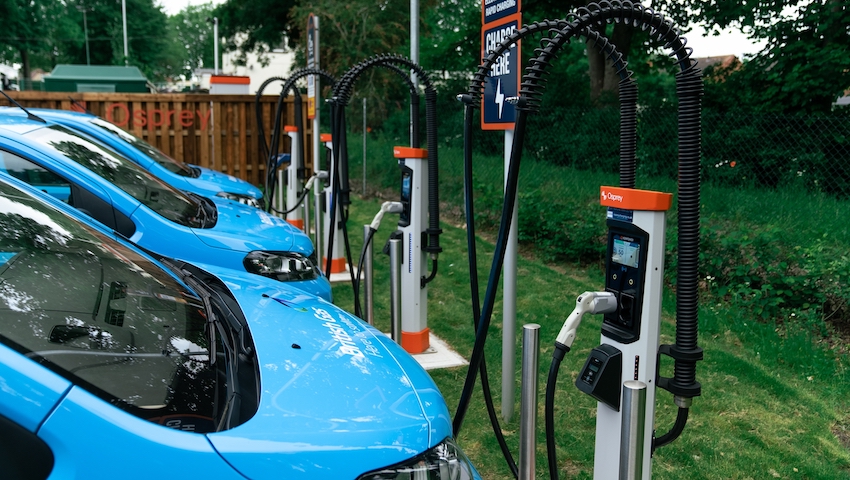Osprey Charging hikes prices up to £1 per kWh due to energy crisis
Osprey Charging’s CEO Ian Johnston has explained his decision to increase the prices of the company’s EV charging services to £1 per kWh.
The decision was announced earlier this week (14th September) as a result of dramatic increases in energy prices.
Ian Johnston, CEO of Osprey Charging, published a short message on YouTube to explain the decision: “Osprey has announced a price increase across our charging networks to £1 per kWh. The circumstances around this change are so extraordinary that I wanted to personally explain what’s happening and why we’ve had to do this.
“The current sky-high energy prices are well documented and there are news headlines everyday about the impacts of the energy crisis. The government has announced a £150 billion support scheme for homes and for businesses. However, as yet, we have no details on this scheme and indeed no timeline on when we’ll have those details. Unlike for residential customers, to date there has been no cap on the price that businesses pay for their electricity. In recent weeks, the price of electricity has risen to more than three times what it was this time last year.”
Last week, UK Prime Minister Liz Truss announced an energy bill relief package of around £150 billion to help offset rising energy bills which will increase to an average of £3,300 from October and up to £6,600 in 2023.
As part of the support package, Truss revealed an energy price guarantee, limiting average annual household bills to £2,500 over the next two years, in addition to the existing £400 discount on energy bills introduced by Boris Johnson.
Truss also confirmed that businesses would receive “equivalent support,” but details of this have not yet been revealed.
Ian Johnston added: “This doesn’t just affect EV charging networks but also local shops, cafes, pubs and factories across the UK. Therefore, I’m sure I won’t be the first CEO of an independent business that is placed in this difficult position. Until we know more about the government’s support scheme, we have no choice but to increase our pricing. Of course, we want to be able to reduce these prices if we are able to do so. We understand how hard things are for our customers right now and we look forward to giving you more positive pricing news in the year to come.”
Why is public EV charging getting so expensive?
Osprey Charging has also published a detailed explainer on its website which outlines the primary causes the rise in energy prices:
Record high power prices are passed on to charging networks
The wholesale electricity price is set by gas, which means that even the price of solar or wind power is impacted by rising gas prices.
Gas prices have been increasing primarily due to the Russian invasion of Ukraine and the cut in their gas supply to Europe, coupled with high demand and stockpiling by countries in preparation for winter.
Record gas prices (8x higher than a year ago) have in turn therefore sent UK electricity prices sky-high.
Charging point operators (CPOs), a bit like consumers, buy from energy suppliers so are subject to the prices they offer: and we can choose whether to fix long-term or not, which we cover below.
Unlike consumers, however, there is no price cap for businesses. So energy suppliers can pass on much more of the high wholesale prices that they themselves buy ahead at.
There is an unsolvable fix-vs-flexible price decision
CPOs have a choice to fix over a longer time period with an energy company, or stay flexible tracking more closely the wholesale price.
Whilst flexibility means a very high price now (due to energy suppliers themselves buying at current high prices), it is expected to come down in future.
The risk is when and how much the prices come down – is it enough to offset riding out astronomical prices now? This is difficult to predict due to uncertainty around the war in Ukraine and Europe’s winter gas levels.
Fixing on the other hand gives predictability of price and smooths out fluctuations: in the current market a CPO would pay less than market rate now but likely above the market rate down the line.
The risk is that once fixed, if prices drop dramatically later such that an energy supplier can offer something cheaper, the CPO cannot change to it. There is therefore less opportunity to pass on future lower prices to customers, until the fixed period is over. The CPO may be stuck paying a much higher amount than market rate later, that is not offset by lower price now.
It is very difficult to predict what will happen in the uncertain circumstances affecting the gas price, and therefore very difficult to take a decision that safely maintains a lower price for our customers through the year ahead.
VAT at 20% means no saving passed on to customers
The price you pay at the EV charger is comprised of the CPO’s electricity cost, VAT and a small margin to cover infrastructure, maintenance and operating costs. Very few, if any, CPOs are profitable at this stage of the market.
We’ve explained the astronomical increase in energy prices, but what about VAT?
VAT is at 20% for public charging, vs 5% for home energy. A year ago, an average rapid charge would have given the govt £1.90 in VAT. Today, that same charge gives the govt £2.90 in VAT.
This, coupled with high energy costs, squeezes the margin that we can add to the energy price without it become inhibitingly high for our customers. That margin is not profit, it covers the cost of installing and running high-power charging infrastructure (between £500,000 to £1,000,000 per site).
20% VAT in the current energy crisis therefore jeopardises the roll-out of high-quality, reliable charging infrastructure for the UK.
